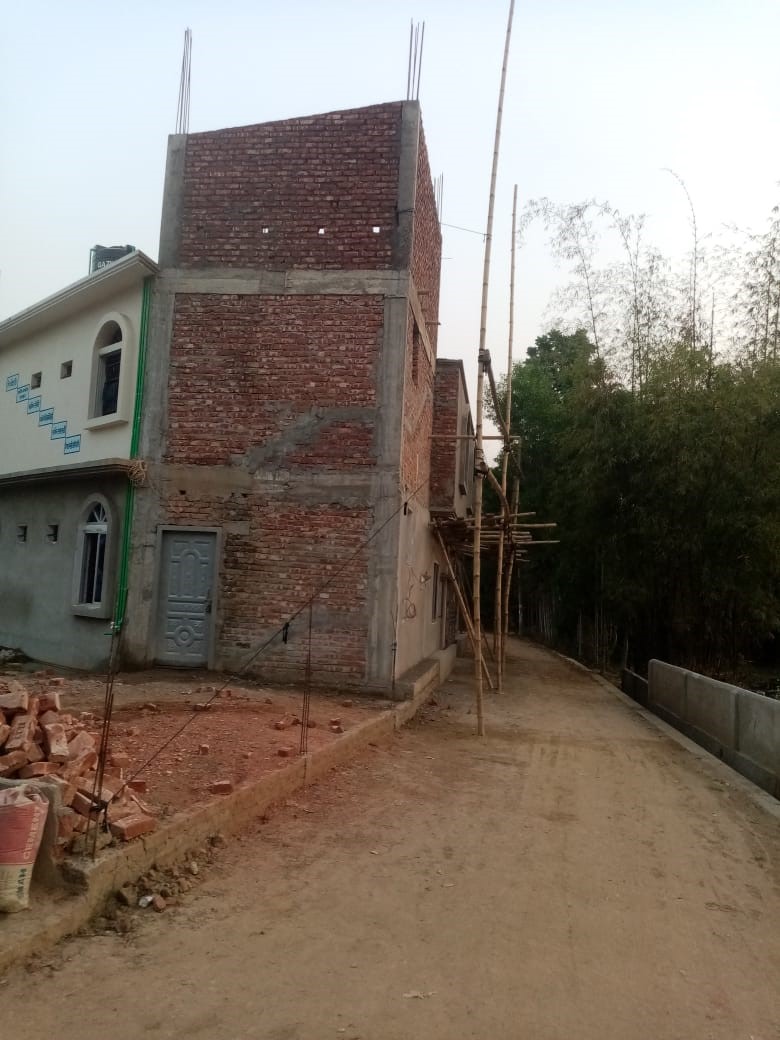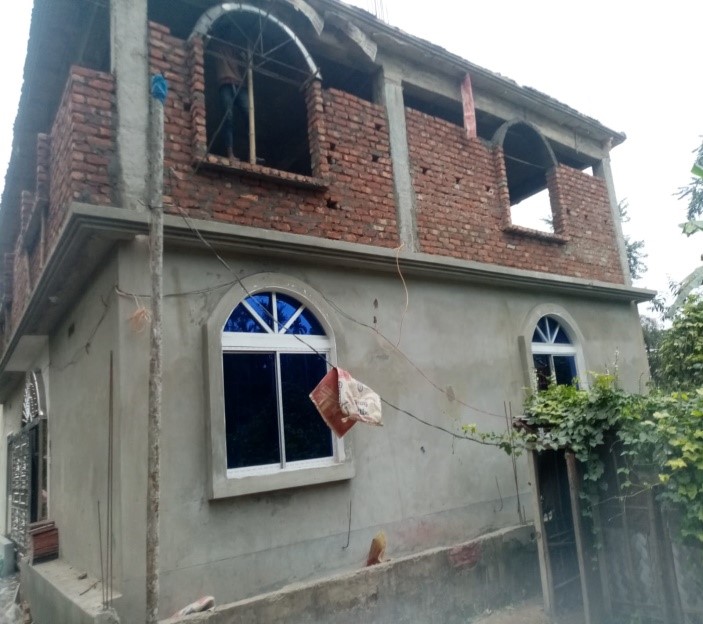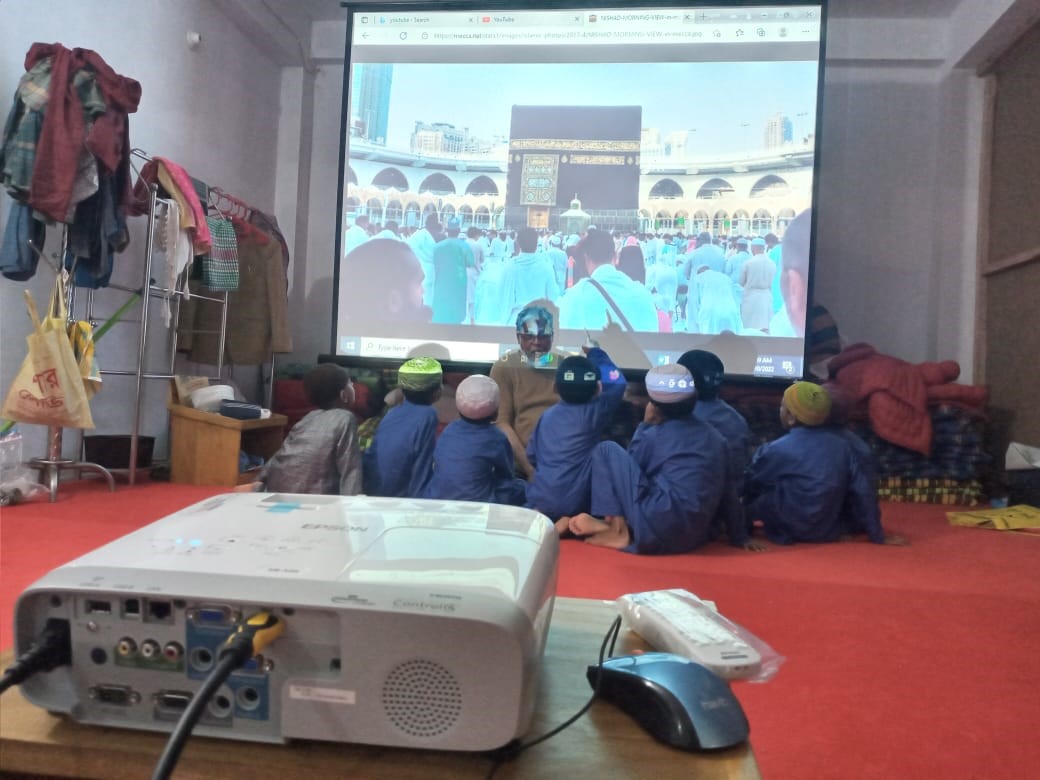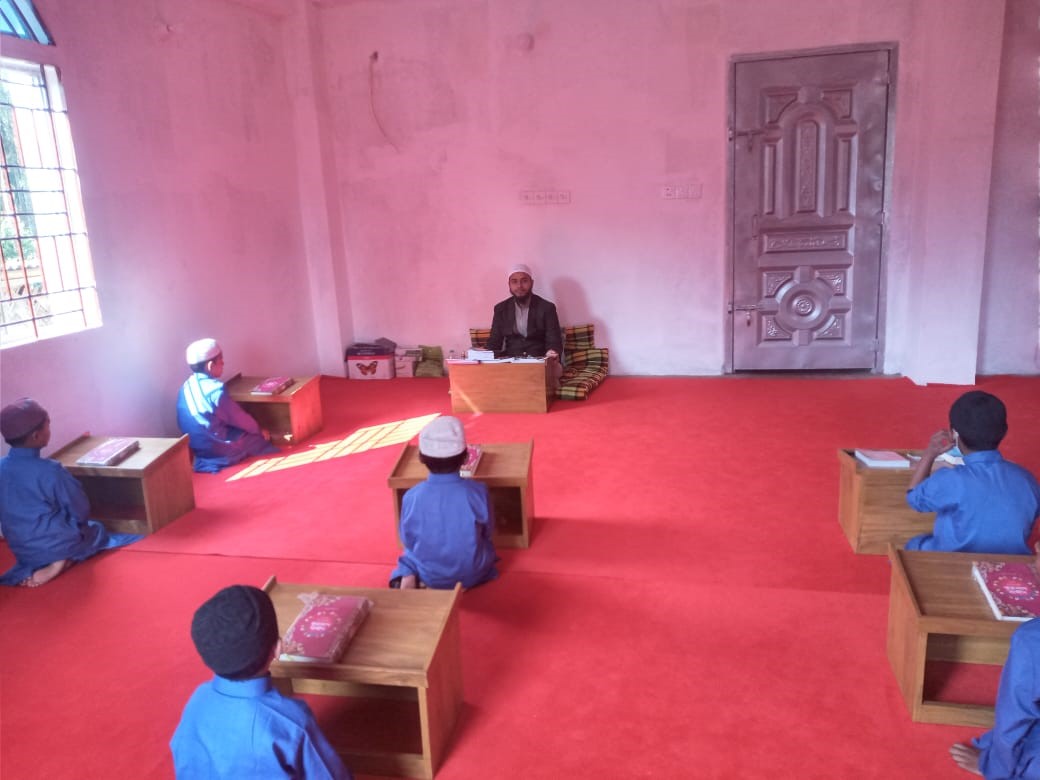
Title of the Project:
Empowering Madrasah Students in Bangladesh: Blended Madrasa Education (BME)
According to many research projects in Bangladesh, 92 % of madrasah students are poor, orphans, helpless, disabled etc. and they are branded as weak performers in education. 75% of them fail to find mainstream jobs after their education and remain unemployed for a long time or are stuck with low paid jobs. Their future generations also follow similar career trends. This happens due to a lack of academic skills (i.e English, Maths, Science, ICT etc.) which they cannot develop due to inadequate support to utilise their fullest potential. Otherwise, they could also perform better like their counterparts from modern education. However, they have talents; Peace Builder will provide full support to shine their talents by providing quality education so that they can build a future in the cross-career fields Insha Allah.
Mostly, the madrasah education cannot provide diverse skills-both religious and also academic skills- suitable enough for the students to compete in the country’s job market. This has been a norm in the society for many years. However, they have talents and their talents should shine.
Aim:The project aims to empower the Madrasah students so that they not only flourish in the field of religion but also confidently in education and in the job markets nationally and internationally Insha Allah.
The BME aims to provide sustainable support in education to the Madrasah students in Bangladesh and endveavours to prepare students for the future to build a skilled professional career like other students in the secular education system at home and abroad. The BME will integrate the core elements of Islamic studies with the core elements of modern education, thus enabling students to specialize in both fields to develop skills in Islamic and academic fields Insha Allah as follows:
- A Hafiz/ Aleem/Mufti with the knowledge of Quranic Arabic and Aqaaid will also specialise in English, Maths, Science and ICT.
- A Barrister, Doctor, Engineer etc. also will be a hafiz with the knowledge of Quranic Arabic and good Iman and Amal.
BME aims to prepare students for Duniya and Akhira. We need both as Allah SWT teaches us in the Quran:

“Our Lord! Give us good in this world and good in the Hereafter, and defend us from the torment of the Fire!”
To fulfill the aim of the project, Insha Allah we will deliver a quality educational programme enabling the students to:
- Memorize (Hifz) the Quran
- Learn and understand Quranic Arabic
- Study Hadith literature
- Learn Islamic studies
- Study English, Maths, Science, Mother tongue, ICT (English Medium)
- Be literate in English and Arabic languages.
Year 1 :
Regretfully, many Bangladeshi students faced discrimination in the UK and also many are facing the same problem in their homeland. It's hard to believe that all madrasa students are treated in the same way. As a result, the only goal of this discrimination is to instil a sense of hardship and prejudice in students from madrasa backgrounds (Mizanur Rahman, 2015).
- Memorize one third of the Qur’an
- Able to speak basic Arabic and English
- Understand basic Qur’an and Hadith
- Follow the blended method in English medium
- Learn basic ICT skills
Quran Hifz with Translation; Interpretation Analysis (Tafseer), Gain proficiency in Arabic, English, Mathematics, Science and ICT and become ready for Scholarship and transfer to the Secondary education.
Teacher student ratio: 1 to 10To provide sustainable support in education to the Madrasah students in Bangladesh and endveavour to prepare students for the future to build a skilled professional career like other talented students at home and abroad, where they can become proficient in Arabic language (including memorization of Quran) and establish themselves in a unique position compared to other students, we will start with 50 students who will be specially taught alike a coaching centre by 5 qualified and experienced teachers from the country and abroad.
Description of the project:In order to provide sustainable support to Madrasah students, a land has been donated by my family to build a Madrasah called ‘Jamia Islamia Hadiqatul Quran’. The ground floor has been completed of the three storied building. The remaining storeys- first, second and third now need to be built. The adjacent land to the building is to be purchased and will serve as a playground for the students. The project also involves introducing Blended Madrasa Education (BME; illustration to follow) method in the syllabus in English Medium, which entails combining core subjects from the Islamic and national curriculums.
The empowerment project will run the BME syllabus for the first five years until the completion of the Primary Board exams of the first group and will continue with secondary students. The BME syllabus InshaAllah will prove that, should there be financial support for the Madrasah students, they can excel in their education like other general students. To prove this, I will take 50 students of age 6-7 years (primary first year) in the project group and make two cohort groups of the same sample size and ability; one from the madrasah and the other from a general educational institute. This will help the project to measure the progress of the students from different groups and will continue for a five year period.
Bangladeshi students faced similar situation in the UK:A similar situation also faced the Bangladeshi students in the UK. The British Education Policy is to support all students irrespective of their abilities, skills, ethnicity etc. and should offer opportunities appropriate to their skills. But the National Curriculum designed helped only the academic students who had skills in literacy and numeracy only which many Bangladeshi students lacked. However, they did possess vocational and practical skills for which the curriculum did not support them at all. As a result, they often failed in their GCSEs and were branded as under achievers who could not find jobs, or a place in training or further education (Home Office, 1985). Ultimately, they became involved in delinquency and unsocial behaviour. This became the norm with many students.
I challenged the national curriculum through my PhD research (2004, examined by Oxford University). The research proposed that the so called underachievers can perform better if the curriculum offers opportunities for them to utilise their full potential by including options to utilise vocational skills in the curriculum. If this was offered, then they could perform much better and could never be branded as underachievers. My research combined classroom based learning together with work-related learning – learning from the work place, using work as a context of learning. This enabled many ethnic minority students (including Bangladeshis) to find employment and secure a place in further education or training who previously were unemployed and out of education for long periods (Home Office survey, 1985). This was achieved by blending academic and vocational skills together in the education system which
helped many Bangladeshi students in the UK. The PhD research proved the effectiveness of blended education and earned many awards including the National Research Award for me.
How the Blended Education will help Madrasah students in Bangladesh?A great majority of parents in Bangladesh want their children to learn Quran, Arabic and also general education. They don’t want their children to remain behind compared to the students in general educational institutes. Their solution is BME- Blended Madrasah Education. The BME will combine core subjects of general education and madrasah education together, instead of choosing the whole range of subjects in both curriculums. For example, they can choose Hifzul Quran, Arabic, Aqaid and Fiqh from Madrasah syllabus and English, Bengali, Mathematics and Science from the General Educational Syllabus. With BME,they will have more career opportunities than the students from general educational institutes.
Careers options for BME students
 The tunnel vision policy:
The tunnel vision policy:
The tunnel vision policy of the system has been victimizing the students where the madrasa education system produces the students who can find jobs mainly in the field of religion and are unable to compete in the job market. Also, the secular system produces students who are capable of finding jobs from the job markets but many of them lack a basic religious education that a Muslim needs to have. The BME strives to stand by the students and provide all possible supports to bring them out of the tunnel vision policy and allow them to shine their talents Insha Allah.
Location of the Project:The empowerment project, BME that led to the emergence of a purpose built madrasah, Jamia Islamia Hadiqatul Quran, in which the Blended Madrasah Education will be commissioned is situated at Shah Road, Village Durlavpur, Dist. Moulvibazar, Bangladesh. It is about two miles away and 8 minutes’ drive from the district town of Moulvibazar, beside the world road.


The project has been started on the 12th of February (see below Reactions) with 13 poor, orphaned and helpless students (currently) in the boarding, two on-site teachers, two virtual teachers from London and one caretaker. The number of students will be increased to 50 and teachers will be increased to 5.



Reaction from academic institutes:
The unique theme of BME to combine both fields together was shared with many institutes, Islamic, secular etc. In summary, the overwhelming responses are that Bangladesh should have such a unique curriculum already. Such a project is going to be first time in the country.
The country’s huge workforce which the madrasah students can build is being neglected and cannot contribute towards the economy. The education system, both modern and Islamic should adopt this policy to produce students with diverse qualities who could compete in the job market in the country and abroad. Furthermore, there should not be any distinction between madrasah and secular students.
Reactions from local politicians, educationists, policy makers etc.The project was opened by the Mayor Fazlur Rahman on the 12th of February, 2022 in attendance with many dignitaries including The Deputy Director of Islamic Foundation, Sylhet Moulana Shah Nazrul Islam, Additional Police Super Mr Hassan Asad, Islami Bank Manager Mr Muhammad Abdullah, Principal Gias Uddin Ahmed, Police Paridarshak Ghulam Murtaza and Director of Village Development Mr Khaled Choudhury.
All of them have admired the aims and objectives of the project. They felt the country needed it much. So many poor, orphan, helpless students who cannot afford mainstream learning can find routes to build their future. It is the BME curriculum that will provide the structure for the provision of quality learning, and their students lacking the prior frameworks within which to situate their learning. And it is the curriculum that articulates both the competencies necessary for lifelong learning and the competencies needed for holistic development in this world and the hereafter.
(1) Academic development-in the positive direction:
Insha Allah the future of the project is bright. The unique curriculum which blends the two fields together and its demand in the country will hopefully prove to be a success. Our experienced and qualified team of teachers, of ratio 1 to 10 which include face to face teaching and virtual teaching by qualified teachers from London will treat the students like a coaching centre to offer the best qualitative education to equip the students for the future. The projects step by step development will include the achievement target in the first year: Basic Arabic and English language learning and conversation; Proficiency in Bengali; Memorization of one third of the Quran. Also the 5th year as Quran Hifz with Translation; Interpretation Analysis (Tafseer), Proficiency in Arabic, English, Mathematics, Science and ICT and prepare students for Scholarship and transition to secondary education.
(2) Financial constraints:
Although the project has high demand in the country, it has high chances to be a failure unless supported financially to fulfil its essential requirements. My family has already spent £75,000 out of which £25,000 are Karde Hasana which I have to return soon. Also, it is a five year long project to educate the students from the first year to the fifth year. This requires about £200,000 to run the project including new purchases (playground). The running cost is estimated to be £18,000 per year which amounts to £1500 per month.
The project’s achievement depends significantly on the financial input. Immediate support is needed.(3) Financial support will help to employ experienced staff and assist them by providing modern equipment. Furthermore, it will help the staff to adopt British education methods to deliver qualitative education in an aim to make the project a success.
The dignitaries warned that the achievements of the project depend heavily on two important factors which are (1) Delivering qualitative education and (2) Financial inputs. They concluded that the delivery of qualitative education is directly proportional to the financial inputs of the project.
I would like to take the opportunity to request help even for a little amount for the project to be fulfilled. This can benefit people in this life and the hereafter.
Dr. Mohammed Abul Lais
Author, National Research Award Winner
PG Dip CG, PhD, FRSA
Email: drlais@ecguidance.co.uk
Web: www.1001appreciations.org